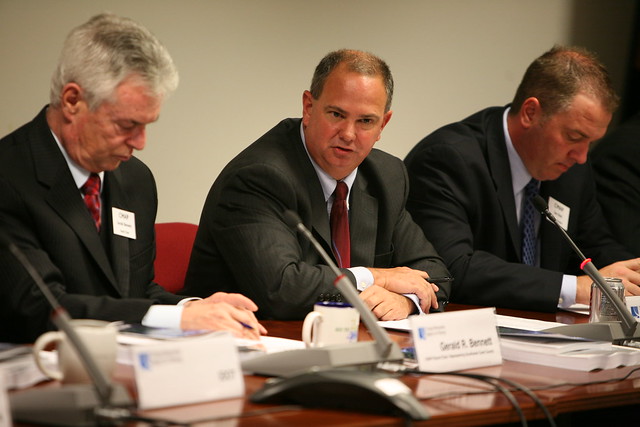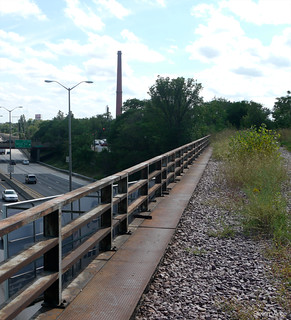
The Chicago Metropolitan Agency for Planning last week floated its own proposal to fix the region's shortfall in transportation funding. It launched FUND 2040, a campaign calling upon the Illinois legislature to fund sustainable infrastructure through a quarter-cent sales tax across the Chicagoland region. CMAP says this increase would generate $300 million annually, which it would use to advance projects that fulfill the goals of its federally-required plan for the region, GO TO 2040.
GO TO 2040 aims to sustainably accommodate population growth across the seven county region by steering investment to already-developed areas, doubling transit ridership, carrying more people on existing highways with more buses and with managed High Occupancy/Toll lanes, and absorbing more rainfall on sites rather than sending it into the area's overwhelmed sewers.
FUND 2040 would align capital investments with GO TO 2040, and to give the region greater autonomy in choosing which projects to fund. CMAP would award funds to projects in existing plans, based entirely on performance measures -- a marked difference from how the Illinois Department of Transportation spends money on politically favored projects like the budget-busting, ill-conceived Illiana Tollway.
The new fund would also put CMAP on surer financial footing. CMAP, as a federally recognized Metropolitan Planning Organization, is funded through the state's DOT, and cash-strapped IDOT has delayed reimbursing CMAP's operations costs on multiple occasions.
CMAP's executive director Randy Blankenhorn said that, while the Illinois General Assembly has yet to write FUND 2040's enabling legislation, the bill "would outline specific goals" instead of listing projects, places, or formulas to be funded. The legislation, he said, would outline project selection criteria because "it's a long-term fund, and needs and funds can change."
Emphasizing general purposes, instead of individual projects, is how the new fund would complement existing funding schemes' sharp divisions. Existing "state and federal funds are very specific," Blankenhorn said. "One will build a multi-use trail, but not flood control."
In keeping with the broad goals of GO TO 2040, Blankenhorn said that CMAP settled on a sales tax, and specifically not a gas tax, because its projects – transportation, parks, and water infrastructure – benefit everyone, both on and off streets. "We admit the sales tax is not the preferred option for many things," he said, "but this is a broad-based tax, that all users of all of the infrastructure pay into."
A good FUND 2040 project, the proposal says [PDF], "is one that meets multiple objectives or that blends transportation modes." Blankenhorn added that the fund would "prioritize projects that cross jurisdictions, because water problems and access-to-transit problems are not defined by municipal or county boundaries."
CMAP spokesperson Tom Garritano listed some well-known proposals that FUND 2040 could potentially help advance, including:
- Completing the Weber Spur Trail in Chicago
- Extending Metra's UP-NW line from McHenry to Johnsburg
- Acquiring land and building parks for The 606
- Rehabilitating nine Metra Electric stations
- Filling funding gaps in partially-funded projects that bring parts of the Chicago Transit Authority system into a state of good repair

CMAP's proposal also highlighted one green infrastructure project as indicative of what FUND 2040 could be used for. Oak Park, like Chicago, is reconstructing alleys with permeable paving that filters stormwater, keeping rain out of Cook County's overburdened, flood-prone sewer system.
The proposal's regional focus means that it will cater as much to suburban as urban interests, so it will still include road work and highway modernization. CMAP's list also included several projects that would expand state highways.
Asked whether road expansion runs counter to the fund's flood-control mandate and wouldn't reduce congestion anyhow Blankenhorn said, "to say we won't widen roads isn't true -- but modernization can mean other things, like changing signalization." Roads also don't just serve cars and trucks: "Pedestrians need access, and we need to [fund] a bigger concept in roads." Blankenhorn said the fund would "definitely" prioritize projects with a "complete streets" design.
Blankenhorn pointed out that the fund would seek to fill "gaps" and to make projects more complete. He gave the example of a city that's going to replace a water main under a street, but doesn't have funds at the time to make other changes to the street – like building protected bike lanes. "We can put some money in to upgrade the street," he said. Garritano added that "it's a matter of efficiency" to fund more complete projects.
CMAP isn't the only group advocating for more local or regional funding that can respond to climate change, regional population growth, and shifting mobility needs. Metropolitan Planning Council vice president Peter Skosey supports the fund proposal, because CMAP could "leverage its dollars to garner federal and state support" for parks, bike trails, new transit buses, and other projects. Such required "local match" funds can be difficult to secure, particularly in less prosperous suburbs with limited budgets.
FUND 2040 would complement other efforts to meet the area's transportation funding shortfall, which is widening as the area's population grows, its existing 19th- and 20th-century infrastructure ages, and existing gas taxes fall. Another campaign launched this year, Transit Future, would raise funding for transportation improvements within Cook County. Transit Future would also likely increase the sales tax -- as was done in Los Angeles County – which would back federal loans and grants to accelerate pricey rail and bus projects across the county.
Unlike Transit Future, FUND 2040 would support a broad array of transportation projects -- including roads and trails across the entire region, plus "carefully selected water and open space projects." There's room for both: Transit Future would fund the considerable but costly transit needs right where they're needed amidst Cook County's dense population, while FUND 2040 can make many smaller projects bloom across the entire region.




